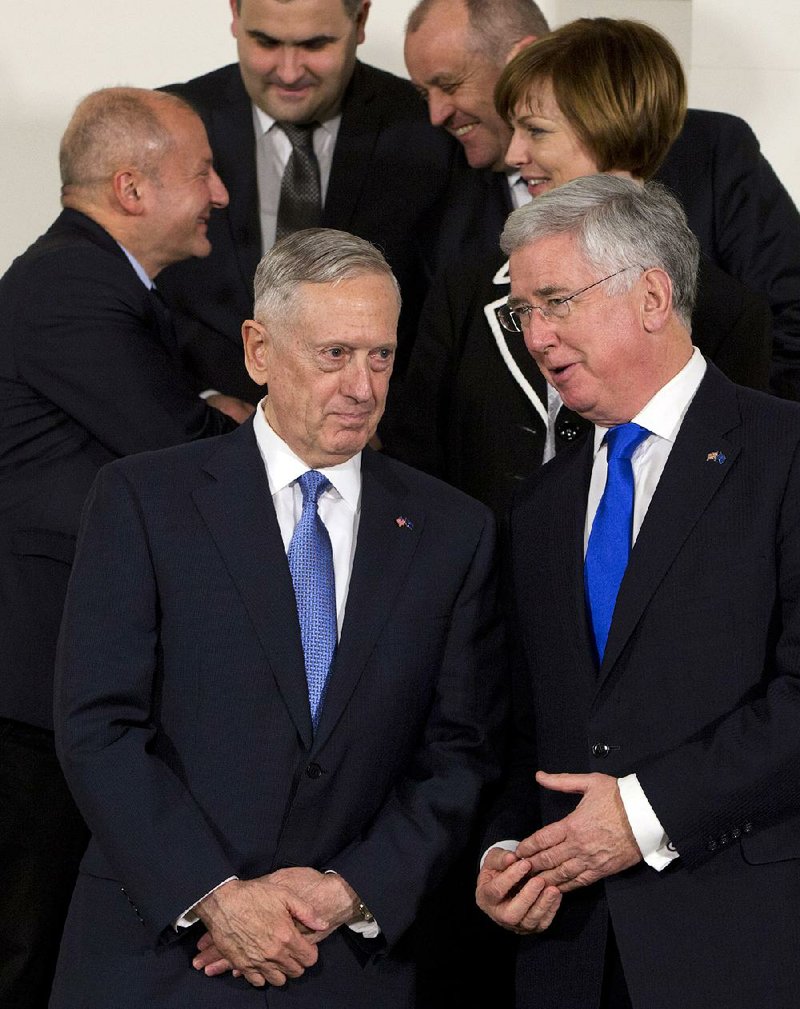BRUSSELS -- U.S. Defense Secretary James Mattis told fellow NATO members Wednesday to increase military spending by year's end or risk seeing the U.S. curtail its defense support.
RELATED ARTICLES
http://www.arkansas…">Illegal leaks felled Flynn, Trump says http://www.arkansas…">Labor choice drops out http://www.arkansas…">U.S. shifts on Mideast 2-state bid http://www.arkansas…">Magnet schools get DeVos' vow of help http://www.arkansas…">Gun-rule repeal passes in Senatehttp://www.arkansas…">IRS rescinds health-law instruction http://www.arkansas…">Immigrant's arrest protested in Seattle http://www.arkansas…">Retail sales up 0.4% in January; Trump touts a tax overhaul
"Americans cannot care more for your children's future security than you do," Mattis said in his first speech to NATO allies since becoming defense secretary. "I owe it to you to give you clarity on the political reality in the United States and to state the fair demand from my country's people in concrete terms."
Echoing President Donald Trump's demands for NATO countries to assume greater self-defense responsibility, Mattis said Washington will "moderate its commitment" to the alliance if countries fail to fall in line. He didn't offer details.
"No longer can the American taxpayer carry a disproportionate share of the defense of Western values," Mattis told the alliance's 27 other defense ministers, according to a text of his remarks.
[PRESIDENT TRUMP: Timeline, appointments, executive orders + guide to actions in first 100 days]
Alliance officials crowded around televisions at the NATO meeting in Brussels to watch the retired general's initial appearance with Secretary-General Jens Stoltenberg. Defense ministers clustered around Mattis as he entered the meeting room.
Citing danger from Russia, Mattis told the closed meeting of ministers they must adopt a plan this year that sets dates for governments to meet a military funding goal of 2 percent of gross domestic product. He called the funding increase a "fair demand" based on the "political reality" in Washington, an apparent reference to Trump's past criticism of NATO as "obsolete" and his much-touted "'America First" mantra.
Noting the threat posed by the Islamic State extremist group in Iraq and Syria, Mattis said: "Some in this alliance have looked away in denial of what is happening."
"We have failed to fill gaps in our NATO response force or to adapt," he added.
Trump has challenged the alliance to take on a greater share of military costs, even rattling European nations by suggesting the U.S. might not defend allies unwilling to fulfill their financial obligations as NATO members.
Mattis didn't go that far, and Wednesday's focus appeared to be on simply increasing military funding if not fully reaching the target. Many European governments face hostility to more military spending, especially as their slow economic recoveries force belt-tightening elsewhere.
The United States is NATO's most powerful member, spending more on defense than all the others combined. It devoted 3.61 percent of the U.S. GDP last year, about $664 billion, to military spending, according to NATO estimates -- a level that has somewhat tapered off in recent years.
Germany, by contrast, spent 1.19 percent of its overall budget on defense. Ten countries commit even less, and seven -- including Canada, Italy and Spain -- would have to virtually double military spending to reach the target. Luxembourg would require a fourfold increase to get close.
Along with the U.S., the other countries that do reach NATO's benchmark for military spending are the United Kingdom, Estonia, Poland and Greece.
British defense chief Michael Fallon said Mattis appeared to welcome a British proposal to create a road map for increased spending. "An annual increase that we're asking them to commit to would at least demonstrate good faith," he said.
Martin Stropnicky, the Czech Republic's defense minister, said in an interview that Mattis' speech was not a surprise and he did not view it as a threat.
"He was absolutely calm and humble and modest," Stropnicky said, adding that his government had increased its military spending. The Czech Republic still spends just more than 1 percent of GDP on its military, according to NATO.
Asked about Mattis' ultimatum, NATO chief Stoltenberg said allies need time to develop plans. Many already are talking about increasing commitments, he said.
"This is not the U.S. telling Europe to increase defense spending," Stoltenberg said, noting that allies committed three years ago to increase spending over the next decade. He said: "I welcome all pressure, all support, to make sure that happens."
Despite the sharpness of his demand, Mattis appeared to recognize Europe's worries and its leaders' desire for clarity on America's commitment to NATO.
In a brief public statement, made while standing alongside Stoltenberg, Mattis called the alliance "a fundamental bedrock for the United States and for all the trans-Atlantic community."
Information for this article was contributed by Lolita C. Baldor and Lorne Cook of The Associated Press and by Helene Cooper and Sewell Chan of The New York Times.
A Section on 02/16/2017
